Mammoth 36th Montreal jazz round-up with Lovano, Cullum, Mammal Hands, Abdullah Ibrahim among the highlights
Monday, July 20, 2015
Each visit there are switcheroos at the goliath Montreal Jazz Festival, this year in its 36th incarnation.
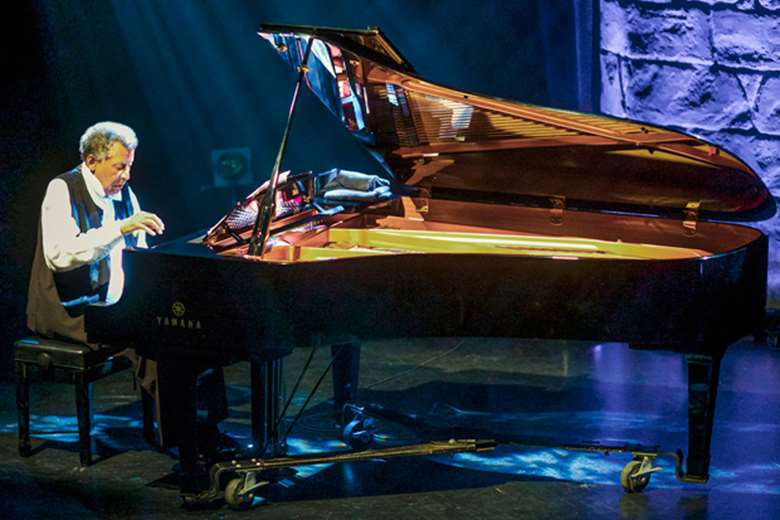
I wasn’t sorry to see Théâtre Jean-Duceppe de-prioritised as an indoor venue in deference to the revamped Monument National but it was a drag the jam at the Hyatt was axed; leaving a late night DJ set to reign at L’Astral and lure the twenty something set. Club Soda’s midnight sets were also curtailed, cutting back options for nightcrawlers comme moi.
Mind you circumstances forced a midweek visit on this occasion, Monday to Thursday, and I was hardly rolling thumbs short of music to check. The Place Des Festivals or, as it is better dubbed in French, ‘quartier des spectacles’ has come into its own in the past few years, the giant TD stage attracting tens of thousands to sandwich between rue Balmoral and rue Jeanne-Mance. The Maisonneuve end of the quartier incidentally used to be red light district in Montreal which boomed in the 1920s and 30s thanks to US Prohibition. However, short of a performance by the Orchestre National De Jazz de Montreal on 1 July and some early evening sets, not much primetime jazz occurred here. As usual Salle de Gesù provided the haven-from-the masses listening room, although a promising new outdoor venue, Club Jazz Casino, just opened below Gesù on Bleury St.
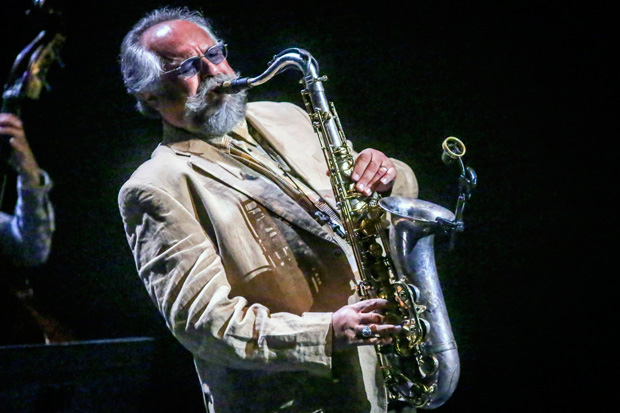
A personal panic ensued on hitting town as Sco(field) and Lo(vano) shifted slots from Wednesday at Théâtre Maisonneuve to Monday and that now clashed with Circuit Rider – Ron Miles, Bill Frisell and Brian Blade – at the Monument plus Erykah Badu at Salle Wilfrid-Pelletier. The toss-up was a no brainer though since Sco’s quartet in the 1980s introduced me to Lovano (above) and I’ve always dug the special pocket with Bill Stewart and Larry Grenadier. Scofield has divided listeners, some love, some loathe but what’s not to like? He conjures a mass of detail, texture, ingenuity, stylistic variation and feel plus coins countless snappy tunes yet some tin-eared detractors (rarely guitar nerds) find his style masturbatory. Scofield’s alliance with Lovano is surely one of the great pas de deux in jazz, the glorious simpatico of characterful tonalities that always hit with nervy energy and edgy rhythm. This was Sco and Lo’s first quartet gig since their European reunion tour of 2008 and they came on hot with ‘Symbolism’, a cut from the forthcoming autumn release Past Present (Impulse!), Scofield’s tribute to his son Evan, who died in 2013. The grey beards (Sco’s somewhat Merlin-like, Lovano’s almost Bismarckian) proved they’ve lost naught of their freewheeling, elliptical time sense and urgent groove.
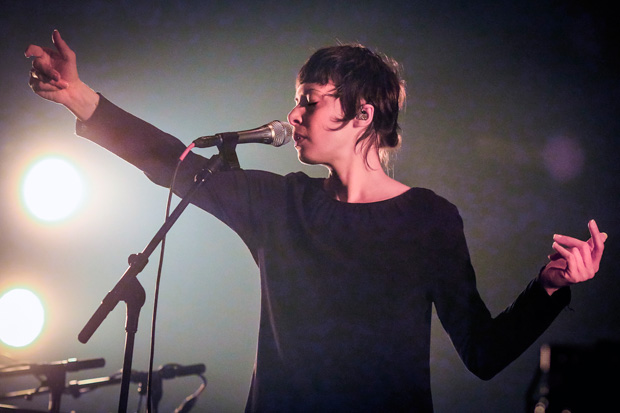
My first set at Montreal had resonated with more langueur. I knew nothing of Melanie De Biasio (above) until she appeared on the smoky, low-lit Club Soda stage flanked by her dangle-haired twin Pascals (pianist Pascal Mohy and clavinet and analogue synth man Pascal Paulus) but she clutched the room in the outstretched palm of her hand for a full fifty minutes before the audience felt confident to interrupt with applause. Not since Norwegians Beady Belle debuted at Soda, with the possible exception of Benjamin Clementine last year, was an act unknown to me quite so atmospheric. The elfin Belgian singer and former ballet dancer twisted arms Marceau-like as she expounded such bittersweetness as ‘Sweet Darling Pain’ at moments using her flute as a prop as she knelt in shadow deferring to skeletal contributions from her group, sounding deeper than on 2013’s No Deal (PIAS) with the addition of spartan acoustic bass. There’s little range to Biasio’s voice or much harmony to the diaphanous music but the vibe, for which her reined in band deserves credit, is effective and original.
During a showcase for about-to-break British jazz compèred by Jamie Cullum on 1 July at L’Astral and underwritten by the BBC and PRS for Music Foundation, two trios followed the soulful and promising Corinne Bailey Rae styled singer Malaika, namely the Peter Edwards Trio and adroitly named Mammal Hands. Edwards came across as the real deal, though perhaps points of reference are more ostensible to a straight jazz audience – McCoy Tyner-ish intensity fused with flashes of Ahmad Jamal/ Wynton Kelly urbanity. The drummer was too loud too, but what a drummer in Moses Boyd, a star in his own right. Suspended, repeated passages and scripted basslines feature in Edwards’ tunes, (check his self produced Safe and Sound) destined to hook inattentive listeners but there is more jazzy thrust and integrity to this trio than others with more notoriety.
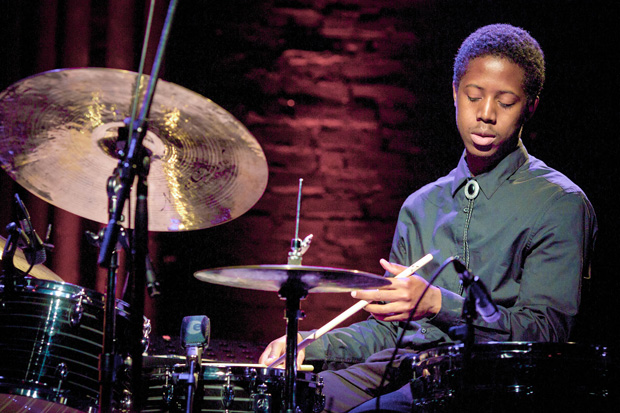
Pianist Nick Smart, brother Jordan on tenor sax and Jesse Barrett on drums and tablas, collectively known as Mammal Hands, headed the Beeb’s bill and proved quite the revelation. Dispensing with bass naturally leads Nick to anchor left hand vamps and hold down the steadfast chimes that are more cliché in other au courant UK trios. He is a solid and pretty player and alongside versatile drummer Barrett legitimises the group but his brother is something else. With a gruff, blunt tone, reminiscent of Sade saxist Stuart Matthewman attempting to stretch out – a more flattering reference might be Ethiopian saxist Getatchew Mekuria – Jordan has unmistakeable soul as a performer, especially when gathering a head of steam, eschewing attempts at acceptable jazz lines in service to emotion and roughhewn timbre. ‘Spinning the Wheel’ is a feature for Smart’s prettier soprano and the tune titles reinforce the Mammal’s beguiling hippy ethos: ‘Intuit Party’, ‘Street Sweeper’ and ‘Tiny Crumb’. Mammal Hands really roused the house at L’Astral but not quite as spectacularly as Cullum did himself earlier in the new-yet-already-hallowed environ of Maison Symphonique.
Cullum hired a crack local jazz orchestra, including such Montreal ringers as tenorist André Leroux and trombonist Muhammad Abdul Al-Khabyyr to join his core team of fine saxist, arranger, conductor Tom Richards, drummer Brad Webb and bassist Loz Garratt. Festival director André Menard later remarked in droll disbelief “non of [the veteran local draftees] looked at their watch the whole show, they were enthusiastic about this gig”. Like Ray Charles used to do, Cullum treated his one-off orchestra like the living organism it was supposed to be, chivvying with wild gesticulations and demanding a response from the audience, not permitting staid passivity on or off the bandstand. Having ripped it up at the Proms and beyond, Cullum was determined to eradicate any stuffiness in the festival’s most cloistered hall, shamelessly flirting with such customized comments as ‘Montreal girls never kiss and tell’ and adapting lyrics from his ironic ‘When I Get Famous’ provoking fans to jump from seats.
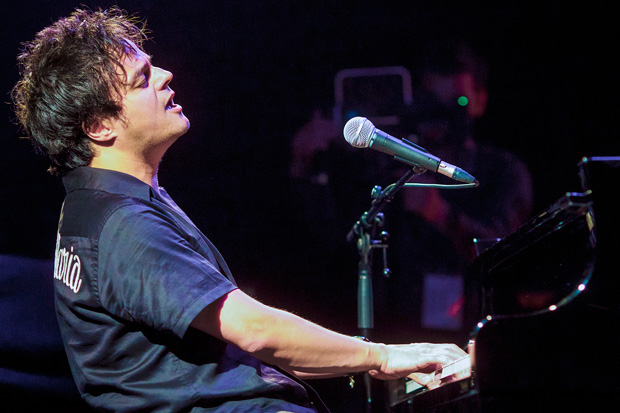
Cullum was a showman out the gate, with a singular trick-bag but he’s doubtless accrued tips touring with Billy Joel and, bashing on a snare drum centre stage when not at the keys, more than likely Coldplay’s Chris Martin. Aside from employing stellar Montreal musicians, he invited Émilie Bernard, a local music teacher who’d posted a video about losing weight running to ‘Everything You Didn’t Do’ from Momentum (Island, 2013) to sing backup, which really charmed. The canny coup de grâce that topped this was a moving interpolation of ‘Amazing Grace’ (elevated in public consciousness, lest we need remind, after Obama’s vocal tribute to those murdered in a Charleston church) amidst his signature rendition of Radiohead’s ‘High and Dry’. This seemed entirely spontaneous, as Cullum asked the big band to “turn on your inner Hans Zimmer” and give him an Eb drone to get things started. After requisite shenanigans exhorting everybody to shimmy front of stage and himself semi-crowd surfing, his encore gambit included a final flirtation, which appeared anything but artificial, in which he implored “Montreal, I’ve given you my all”, which he surely had.
Perhaps the most diametrically opposed piano performance to that of Cullum, (who slapped and kicked his Yamaha while beat-boxing but still spared himself trenchant solo space at sporadic moments) was the solo set by statesmanlike South African Abdullah Ibrahim (pictured top of page) at Gesù. Ibrahim takes his time, like raising water from an ancient well, to quote one of his well-trodden themes and he presides, somewhat like Cuban maestro Omar Sosa, as if you are casual guests in his sitting room while he tickles the ivories for his own amusement. His measured left hand operates like a paddle in a calm lake, progressively ascending gently anthemic diatonic chords that seem to float forever. The eponymous cut from his gorgeous 2011 Sunnyside album with Ekaya Sotho Blues - the Sotho are a Bantu ethnic group who trace lineage in the South African nation of Lesotho back to the fifth century - acted as a leitmotif during Ibrahim’s albeit hour long initial soliloquy which bypassed his best known songs including ‘The Mountain’ and ‘The Wedding,’ taking in fragments of Monk’s ‘I Mean You’, Randy Weston’s ‘Hi-fly,’ Debussy-esque wholetone flecked impressionism and inevitably, essences of Ellington, en route. Those lucky enough to catch all of Ibrahim’s performances during the Invitation Series, which embraced his Mukashi Trio with flute and cello and ultimately the Ekaya Septet, were set to enjoy a meditative oasis from the bustle of the rest of the fest.
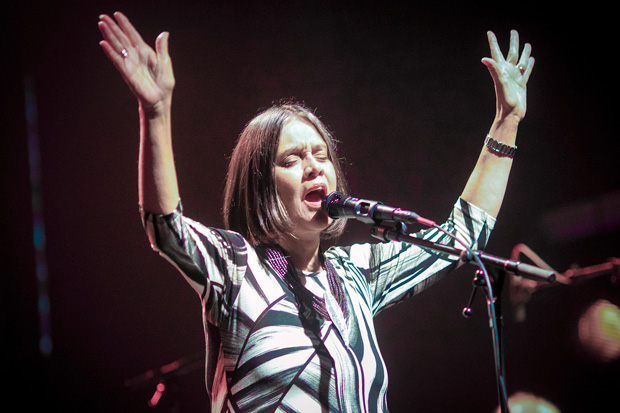
Another set close to rivalling Ibrahim’s knowing centre came from delectable Brazilian singer/songwriter/guitarist Joyce Moreno (above) who appeared with her husband/drummer/producer Tutti and nifty pianist Helio Alves. The storied carioca commanded a regal air with bobbed hair and a striking amulet around her neck as she mixed Jobim classics - such as ‘Aguas de Março’ (the most relaxed version ever) and ‘Desafinado’ (avec ‘shout’ section and Eartha Kitt growl) - with her own songs, including ‘Le Chant des Anciens’ inspired by Afro-Brazilian mythologies. Though celebrated as an MPB (Brazilian popular music) icon (she prefers the term MCB or Creative Music of Brazil), Moreno was initially inspired by Miles and Billie Holiday and there is a steely equilibrium to her graceful stagecraft.
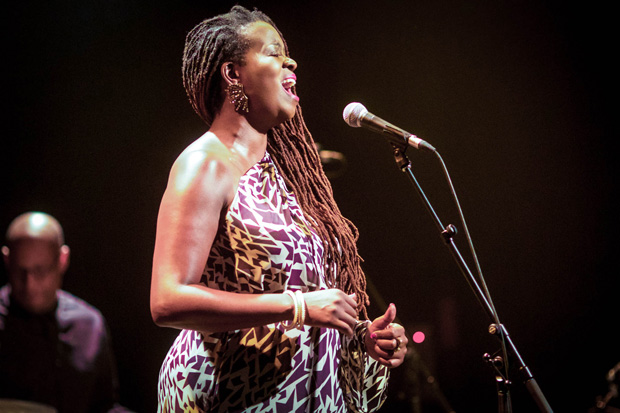
A different singer, at the other end of her career, made her return visit to Montreal having subsequently broadened her life experience with a sabbatical in Nigeria. Somi’s (above) latest album Lagos Music Salon (Okeh) reflects this life changing trip, and is a finely poised, accessible release, sexily laid-back but with an Afrobeat seam, including a take on Fela’s ‘Lady,’ first introduced to these ears by Somi’s mentor Hugh Masekela. Her rendition of ‘Two Dollar Day’ at L’Astral reflected a fresh consciousness and her brave revision of ‘Four (African) Women,’ though an entirely different kettle of fish to Nina Simone’s powerful statement still tingled the spine when Somi called out with sudden clamour. Here she conjures Björk, and there the rangy refinement of Dianne Reeves.
L’Astral hosted many of the hipper gigs apu, including Thomas Carbou’s trio with David Binney and Dave Douglas’ High Risk quartet. The latter which wears environmental concerns on its conceptual sleeve is a heady sound brew that benefits enormously from the creativity and physical energy of Michigan born beatmaker/laptop dude Shigeto and the breakbeats of drummer Marc Guiliana - they hardly need Douglas’ brassy, curiously unaffecting trumpet volleys scything through.
Shows I part audited or jumpcut from, either out of necessity or desire included Booker T Jones - whose most un-Hendrixian guitar feature ‘Hey Joe’ didn’t connect in an era when wife-shooting has become unfashionable - and the promising, bashfully be-titled ‘Heads of State’ with Gary Bartz, Buster Williams, Larry Willis and Al Foster. The Heads gig began somewhat inauspiciously as Bartz hadn’t quite tuned in his curly soprano for ‘I Wish I Knew’. Bartz tends to generate momentum over the long haul however and by the time I’d returned from an intimate green room photo call with Erykah Badu, who was presented with the Festival’s Ella Fitzgerald award (pictured below), the Heads had garnered a standing O at Gesù.
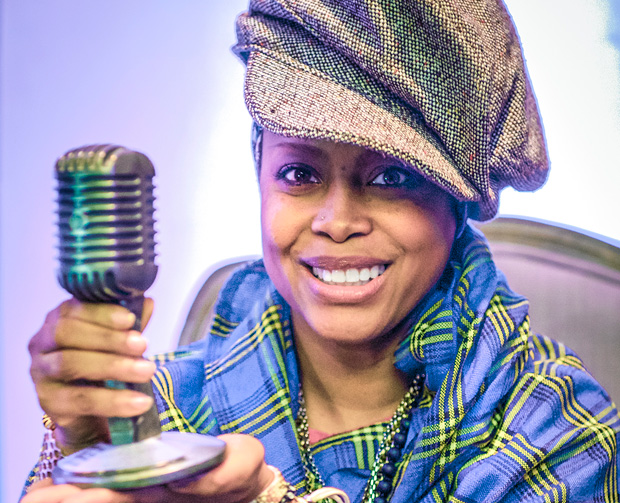
Be-bangled and big time be-capped Badu ruffled some feathers by being late to perform but was demure and accommodating as she hoisted the hefty Ella mic-shaped gong backstage. She insisted that since Fitzgerald had perfect pitch any direct comparisons with her rap-style were preposterous but she shared with Ella the perception of the voice as a drum. With bells rattling at her ankles Badu also name checked Joni Mitchell as an influence, someone who treated ‘laughing and crying as the same thing,’ and confessed that her own lean output resulted from the quest to actually live more before creating art that is supposed to reflect life. Wise words.
Another such art-is-life icon was Edith Piaf and as he did in 2011 alongside Cuban pianist Gonzalo Rubalcaba, French accordionist Richard Galliano customarily disavowed the unwieldiness of his wheezy instrument with an absolutely stunning tribute to ‘the sparrow’ in duo with brilliant guitarist Sylvain Luc at Gesù. Other discoveries this year included the dynamic Mexican flamenco-jazz-metal guitar duo of Rodrigo Y Gabriela, the ludicrously talented eleven year old pianist Joey Alexander, who opened for the Wayne Shorter and finally, as I broke away from a hugely popular set by Austin’s The Mavericks on the TD stage, wracked by jazz guilt - Lorraine Desmarais (pictured below with Oliver Jones). Fifty something Montreal pianist Desmarais’ career was launched by the festival in 1984 and she subsequently bagged the coveted Oscar Peterson Award. A protean player with classical chops as demonstrated by parsings of Chopin and Bach at Gesù, there seemed no end to Desmarais’ inventiveness, reminding somewhat of Monty Alexander in her breadth, timing and sense of drama.
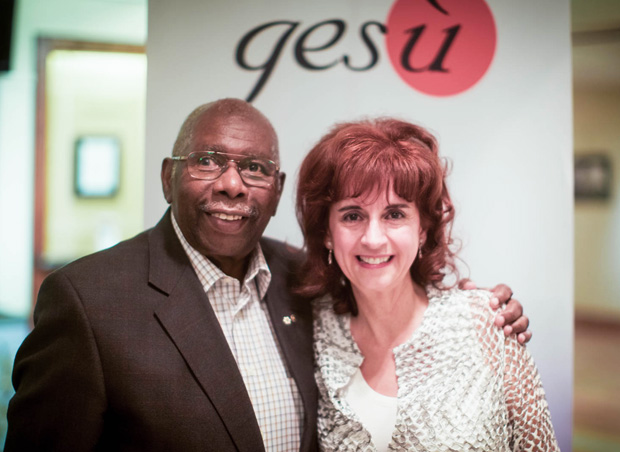
A highlight was the nimble tango of ‘Alberto’, which Desmarais describes thusly in notes to her 2012 CD Couleurs de Lune (Analekta): “This song asks of the milonga that which it can’t fully accomplish. The jazz dialogue is too strong and relentless, with impossible flourishes of tango. More than ever, the improvisations try to impress each other with their elegance and delicacy…” This gives an idea how her two fisted imagination took hold, concluding several encores with Oliver Jones’ bluesy romp ‘Something for Chuck.’ Eighty-year-old fellow Montreal piano ace Jones, who is knight (or chevalier) in Canada thanks to his considerable contributions to music, was in attendance and joined Desmarais in the lobby for a collegial embrace after the show. A cute kiss off to end another edifying visit to this fabulous fest.
– Michael Jackson (report and photos)